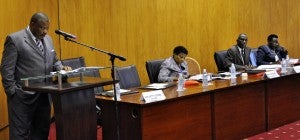As reparations are considered in Northern Uganda, ways are sought to equally include female survivors
Date:
Following decades of civil strife and insurgency in northern Uganda, there has been much discussion on how to achieve lasting reconciliation. High on this agenda is reparations for its victims. Reparations can acknowledge the rights and dignity of those harmed by conflict by providing some justice, and the resources to rebuild lives and communities. Yet any such programmes and frameworks must respond to the particular needs of all its victims, including those considered especially vulnerable.

From 13 to 14 February 2012, a national conference was held in Kampala to discuss these issues. Titled “Reparations Policy and Programming: Charting a Way Forward in Uganda, it sought to prompt discussion on recent research and support steps toward an effective, inclusive Ugandan reparations policy. It was hosted by the Uganda Human Rights Commission (UHRC), the UN Office of the High Commissioner for Human Rights (OHCHR) and United Nations Entity for Gender Equality and the Empowerment of Women (UN Women).
Two reports were launched at the event. “The Dust Has Not Yet Settled describes victims' experiences and their views on reparations, according to their entitlements under domestic and international law, and was published by the UHRC and OHCHR. “Reparations, Development and Gender", by UN Women and the UN Development Programme (UNDP), highlights the links between reparations and development, and the ways in which a gender perspective can be built into any framework.
Civil society and government participants at the conference concluded that state action on reparations was both needed and legally required. “What we are seeking here is a balancing of the equation, said Hon. Justice Lawrence Gidudu, Chairperson of the Justice Law and Order Sector Transitional Justice Working Group, in his keynote address. “A lot of energies and resources have been going into prosecuting the offenders and now, to balance the equation, the victims need attention.
The conference also noted that Uganda's Peace Recovery and Development Plan was not addressing the particular needs of women victims, and had not adequately consulted them in its design or processes.
In her presentation, the UN Special Rapporteur on Violence against Women, Ms. Rashida Manjoo, noted that the kinds of violence experienced by women during conflict were linked to their social, political and economic vulnerabilities. Reparations, she said, were an opportunity to change rather than perpetuate these. “Violence perpetrated against individual women generally feeds into patterns of pre-existing and often cross-cutting structural subordination and systemic marginalization, she observed in her address. “Therefore, measures of redress need to be linked to individual reparation and structural transformation. This implies that reparations should aspire to the extent possible, to subvert instead of reinforce the patterns of discrimination and inequality that are a root cause of the violence that women experience.
Discussions explored holistic and victim-centred approaches to remedy. These include material and symbolic measures, such as the payment of individual compensation, and the use of monuments and remembrance ceremonies. Vice Chairman of the Pader District Local Council, Akena Alfred, observed that reparations should go beyond payment and address other consequences of the war, such as emerging diseases.
By engaging a broad cross-section of Ugandan society and highlighting the voices of its most vulnerable survivors, the conference — and the reports that were released — aims to ensure that life after war will bring greater opportunity for Ugandan women.